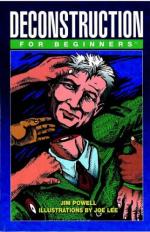|
This section contains 968 words (approx. 4 pages at 300 words per page) |

|
Deconstruction is a philosophical-critical approach to textual analysis that is most closely associated with the work of Jacques Derrida in philosophy and the Yale School (Paul DeMan, J. Hillis Miller, Geoffrey Hartman) in literary theory and criticism. Derrida draws the term déconstruction from his interpretation of Martin Heidegger as a way to translate two Heideggerian terms: Destruktion, which means not destruction but a destructuring that dismantles the structural layers in a system; and Abbau, which means to take apart an edifice in order to see how it is constituted or deconstituted. For Derrida, then, deconstruction, in the context of philosophy, refers to a way to think the structured genealogy of philosophy's concepts while exposing what the history of these concepts has been able to obscure or exclude. By displaying those concepts that the philosophical tradition both authorizes and excludes, a deconstructive reading seeks to work within the...
|
This section contains 968 words (approx. 4 pages at 300 words per page) |

|


